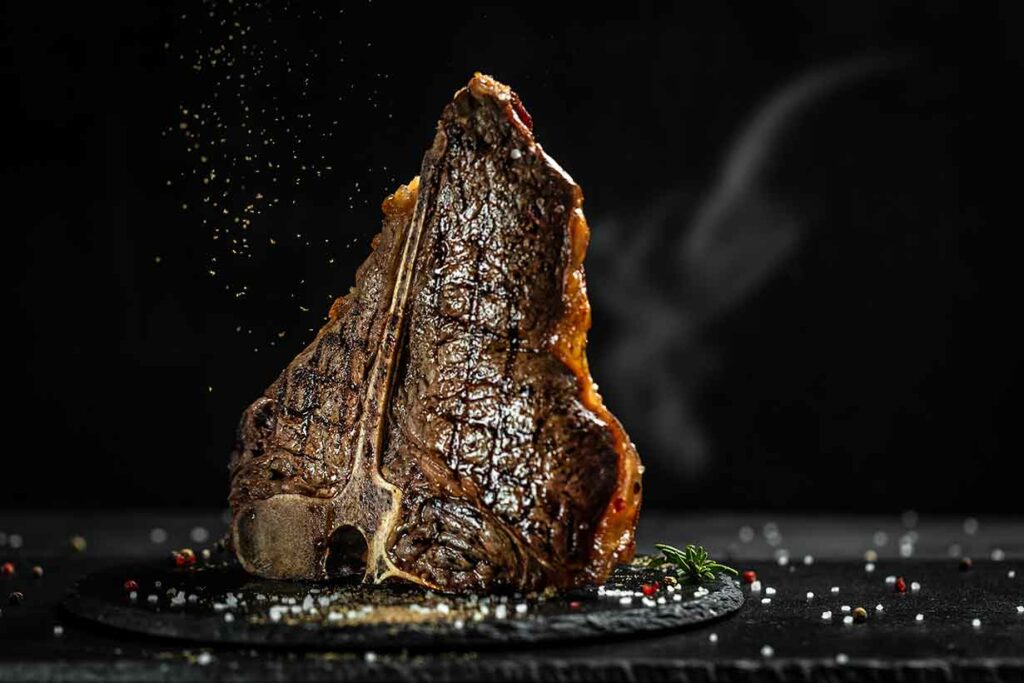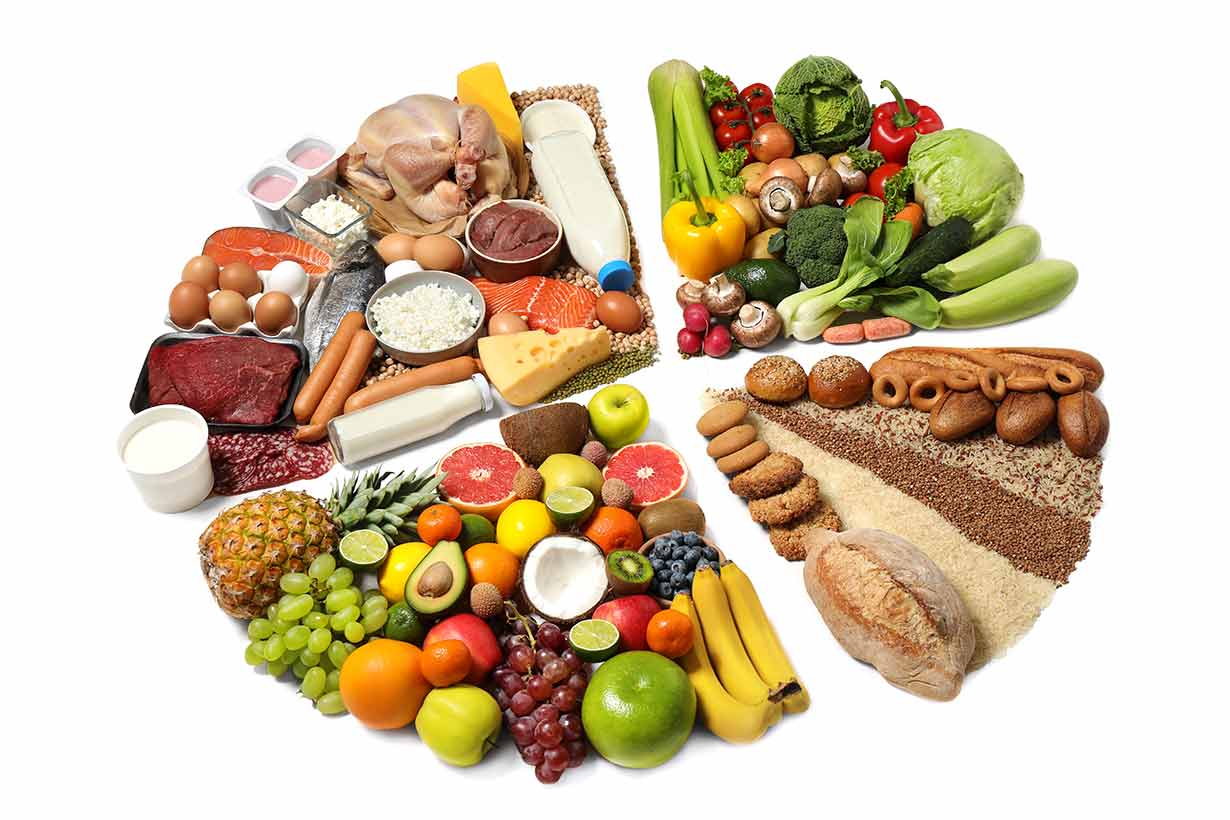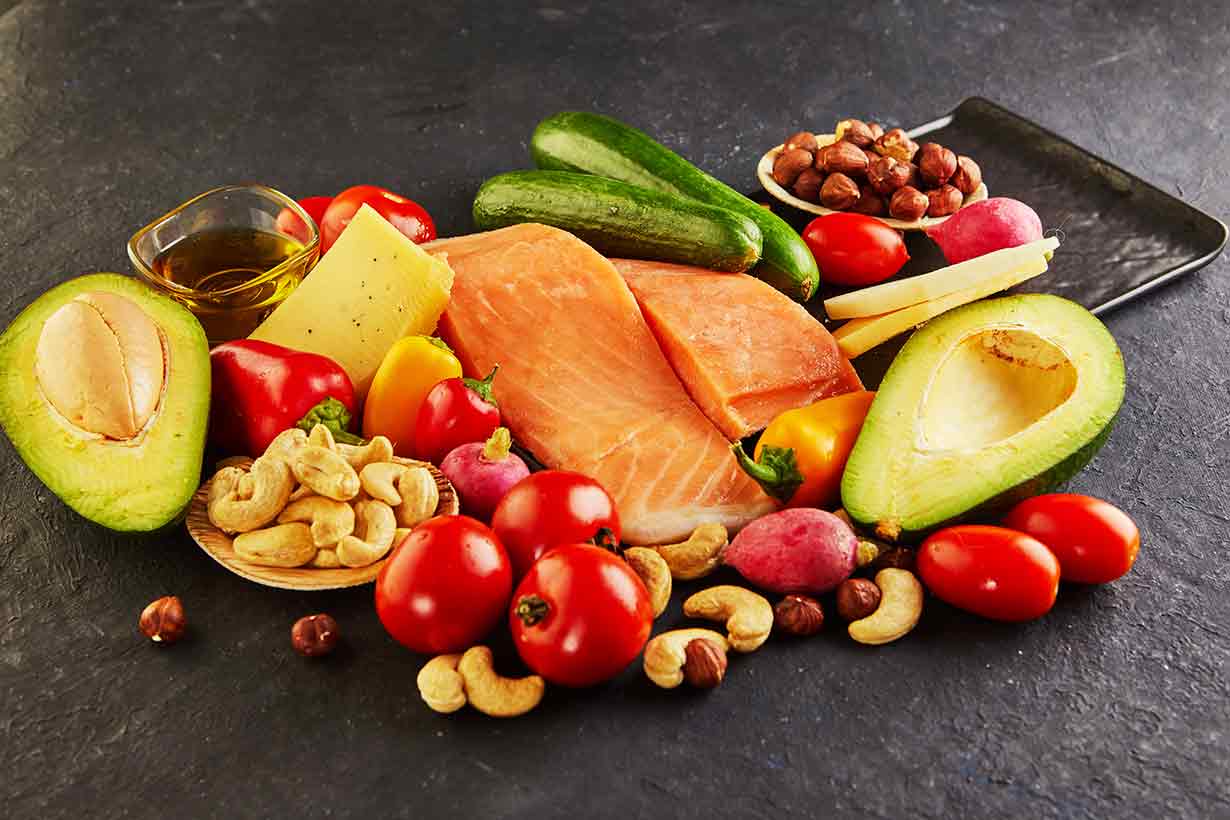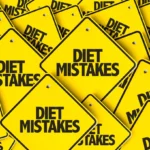Over the past several years, an all-animal-foods diet referred to as the carnivore diet has become increasingly popular.
Carnivore diets are currently one of the most controversial—and polarizing—ways of eating.
Generally speaking, a lot of commentary on the diet tends to be overly for or completely dismissive of its use.
This article aims to provide a balanced but factual review of carnivore diets and their potential benefits and downsides.
Table of contents
What Is a Carnivore Diet?

First of all, let’s define what a ‘carnivore diet’ is.
By its very nature, a carnivore diet is a way of eating that includes only animal foods.
While some animal foods (such as shellfish) can contain carbohydrates, a typical carnivore diet is a zero (or very low) carbohydrate) diet.
Other promoted versions of ‘carnivore diets’ exist, with some having various levels of “allowable” plant foods. However, such diets seem to be called ‘carnivore’ for marketing purposes rather than anything else, and they are, more accurately, omnivore diets.
This article will focus strictly on true carnivore (animal-based food) diets.
One of the most prominent advocates of the carnivore diet is a doctor of medicine called Shawn Baker. Further, popular media personalities such as Joe Rogan, who hosts a famous podcast, have further popularized the diet.
It is important to note that there has been very little research on the health effects of a carnivore diet. For this reason, it is challenging to support bold claims of beneficial or detrimental health effects with evidence, and careful appraisal of such claims is necessary.
Why Do People ‘Go Carnivore’?
Compared to other low-carb diets, such as the ketogenic diet, why do some people opt to eliminate plant foods and try a carnivore diet?
Firstly, proponents of the diet often talk about the carnivore diet resolving food sensitivity issues.
On this note, several components of plant foods can cause issues for some people. Some clear examples include gluten, saponins, oxalate, and goitrogens (1, 2, 3).
Thus, some people with sensitivities to specific plant components may feel better upon adopting a carnivore diet if that component is therefore eliminated from their diet.
However, for most people, the complete elimination of plant foods (aside from those which were part of the problem) would not have been necessary.
Apart from this, some people follow the diet due to anecdotal health claims about the diet being beneficial for body composition and weight loss. There is currently little scientific research to support these claims, however.
What Foods Can You Eat On a Carnivore Diet?
Since a carnivore diet means animal foods, it can include the following types of food:
- Animal food products: bacon, ham, jerky, sausages, etc
- Dairy: butter, cheese, milk, yogurt, etc
- Eggs of all varieties
- Fish: anchovies, bass, bream, cod, eel, herring, mackerel, salmon, sardines, trout, etc
- Meat and poultry: beef, bison, chicken, duck, lamb, pork, turkey, venison, etc
- Shellfish: abalone, clams, cockles, crab, lobster, mussels, oysters, shrimp, etc
- Seasonings like salt, pepper, etc
Excluded Foods
Carnivore diets exclude all plant foods, regardless of how much nutritional value the individual foods have. In other words, it is pretty much the opposite of plant-focused diets like the Nordic Diet.
These excluded foods include all types of:
- Fruit
- Grains
- Nuts
- Legumes
- Seeds
- Vegetables
What Might Carnivore Diet Meals Look Like?
For those trying to get their head around a carnivore diet, here are some examples of what meals might look like.
- Bacon and eggs
- Pan-fried steak with shrimp
- Lamb chops
- Chicken drumsticks
- Grilled steak with eggs
- Baked salmon with cheese omelet
As we can see, the carnivore diet is precisely that; meals feature meat, seafood, eggs, and dairy.
Potential Benefits of Carnivore Diets
Before examining whether the carnivore diet has any potential benefits or downsides, it is important to point out that all diets can have benefits and downsides.
In other words, just because a particular way of eating has some benefits doesn’t necessarily mean it is a good choice.
Likewise, a diet with some clear downsides does not mean that it can’t be a good way of eating.
Let’s now take a look at some potential benefits of carnivore diets.
High-quality protein content
Most animal foods, such as meat, fish, milk, and cheese, tend to be excellent protein sources.
These foods are all complete proteins, making it relatively easy to meet protein requirements.
By their very nature, carnivore diets tend to be higher in protein than regular diets.
However, this is not a unique ‘benefit’ as such, as it is perfectly possible to get sufficient protein from omnivore, vegan, and all kinds of diets.
While frank protein deficiency is rare, some populations, such as resistance-trained athletes and older adults, can benefit from a higher protein intake (4, 5).
For example, A 2010 prospective cohort study looked at a subset of participants (24,417 women) from the Women’s Health Initiative Observational Study.
Across this group of women, a 20% increase in biomarker-calibrated protein intake was associated with a 32% reduced risk of frailty (6).
A more recent 2018 systematic review and meta-analysis examined ten studies featuring 50,284 older adults aged 60 or over. Overall, the review demonstrated that high protein intake (compared to low protein) was associated with a 33% lower risk of frailty (7).
Resolving Food Sensitivities
There are many anecdotal claims of people resolving gastrointestinal issues on a carnivore diet.
Firstly, anecdotes are weak forms of evidence that have not been independently tested and verified by research scientists.
However, as previously mentioned, specific components of plant foods, such as gluten, saponins, oxalate, and goitrogens, can cause issues for a small proportion of the population (1, 2, 3).
If these individuals remove all plant foods from their diet, they would also be eliminating the components of plant foods that were causing them issues. In this case, they may see their health issues resolve on a carnivore diet.
That said, permanently eliminating all plant foods—whether problematic or not—is not an ideal way to approach this issue.
An’ elimination’ diet might be preferable for those who have issues and are open to a carnivore-style diet.
An elimination diet in this sense would work by removing plant foods from the diet and then slowly adding them back in, one by one, to see which food(s) caused the issue.
Also, working alongside a dietitian specializing in gastrointestinal issues would be ideal when identifying the cause of such problems.
Weight Loss
Once again, there are numerous anecdotal claims of successful weight loss with carnivore diets.
There is, unfortunately, little research evidence on this topic.
However, a recent study did provide data on self-reported changes to various health measures when following a carnivore diet.
In this 2021 study, published in the Current Developments in Nutrition journal, 2020 participants followed a carnivore diet (mainly for purported health reasons) for a median 14 months.
Here are the self-reported weights of the participants, showing current measurements (post-diet) and measures before their carnivore diet (8):
| Measurement | Current | Prediet |
|---|---|---|
| Weight, kg (median) | 76 | 85 |
| BMI, kg/m², (median) | 24.3 | 27.2 |
As we can see from the table, there was an appreciable 9kg reduction in median weight and a 2.9 reduction in median BMI.
Furthermore, among 928 individuals reporting chronic obesity/overweight, here is how they reported a carnivore diet influenced their condition (8):
- 52% of participants reported their obesity/overweight resolved
- 41% of participants reported their obesity/overweight improved
- 5% of participants reported that their obesity/overweight didn’t change
- 1% of participants reported that their obesity/overweight worsened
However, it is important to emphasize that all these data are self-reported.
In other words, the participants’ weight was not independently measured and verified as it would be in a controlled trial.
The participants are all following a carnivore diet as their chosen/preferred diet, so the data is also prone to bias.
That said, despite the quality of the evidence, these data do reasonably suggest that carnivore diets may be beneficial for weight loss – at least in the short term.
Carnivore Diets Eliminate Sugar and Refined Carbohydrates
Since carnivore diets eliminate all plant foods, this also means that the diet won’t contain nutritionally poor, energy-dense foods.
To illustrate this point, donuts, cream cakes, candy, fries, and potato chips are all plant foods many people over-consume.
For some people, having a strict diet protocol can also work better than ‘moderation’ for controlling their consumption.
Therefore, one of the most significant benefits of a carnivore diet is likely the foods that it removes from the diet.
Potential Downsides of Carnivore Diets
Now that we have looked at the potential benefits, let’s look at some downsides of carnivore diets.
Total Elimination of Nutritious Plant Foods
The carnivore diet eliminates all plant foods, and some of these foods are highly nutritious.
Furthermore, many plant foods, such as fruit, vegetables, and legumes, are consistently associated with benefits in extensive, high-quality cohort studies and systematic reviews (9, 10, 11).
Additionally, plant foods provide a broad range of phytochemicals, such as polyphenols.
Research on these non-nutritive plant compounds is in its infancy, but it is thought they offer benefits for human health.
More research is necessary to understand the mechanisms of polyphenols fully, but the current evidence is strongly suggestive that polyphenol-rich diets are associated with better health outcomes (12).
Low In Fiber
Since they exclude plant foods, carnivore diets are very low in dietary fiber.
While proponents of the diet often claim that fiber “isn’t necessary,” there is a difference between what is essential and optimal.
Based on the existing evidence, research consistently identifies a higher fiber intake as beneficial.
For example, a 2018 umbrella review of eighteen systematic reviews and meta-analyses demonstrated that the highest intakes of fiber (compared to the lowest) were associated with:
- 18% reduced relative risk of CVD mortality
- 16.5% lower relative risk of all-cause mortality
- 9% lower relative risk of cardiovascular disease incidence
- 7% lower relative risk of coronary artery disease
- 42% lower odds of pancreatic cancer
Some carnivore diet proponents ask, could higher fiber diets just be better than the standard American diet rich in sugar and refined carbohydrates?
In large observational studies, the researchers ‘adjust’ the data to account for potential covariables like diet quality.
It is imperfect, but after adjusting for diet quality (and various lifestyle factors), participants still benefit from greater fiber intake, all else being equal.
Harder To Consume the Recommended Intake For Various Nutrients
It is common knowledge that some diets make it harder to obtain all essential vitamins and minerals. For instance, B12 supplementation is a must on vegan diets.
Similarly, a carnivore-style diet makes it harder to obtain sufficient amounts of crucial vitamins and minerals than a well-formulated omnivore diet.
First, there are some vitamins and minerals that a carnivore diet may provide in large quantities, providing a broad range of animal foods are consumed. These nutrients include B vitamins, vitamin D, calcium, iodine, iron, zinc, selenium, phosphorus, potassium, and choline.
If foods like liver are consumed, the diet can easily provide sufficient folate and vitamin A too.
However, some of the nutrients that can be more difficult to obtain at recommended intake levels include:
- Vitamin C
- Vitamin E
- Vitamin K
- Magnesium
Phytate-containing plant foods can inhibit the absorption of some nutrients, such as magnesium.
For this reason, it is reasonable to suggest that magnesium needs would not necessarily be as high on a carnivore diet.
However, there is little research in this area, so we cannot make any confident claims.
Where To Find These Nutrients In Animal Foods?
It is possible to find more significant amounts of vitamins C, E, and K and magnesium in specific animal foods.
However, this requires being more selective about the foods consumed.
The table below shows some animal-food sources (cooked weight) of these nutrients:
| Nutrient | Recommended daily value (% DV) | Animal foods that contain nutrient | Amount of nutrient per 100g | % Daily value per 100g |
|---|---|---|---|---|
| Vitamin C | 90 mg | Beef spleen | 50 mg (13) | 56% DV |
| Sweetbreads | 39.1 mg (14) | 43% DV | ||
| Kielbasa | 14.7 mg (15) | 16% DV | ||
| Vitamin E | 15 mg | Roe (herring) | 7 mg (16) | 47% DV |
| Conch | 6.33 mg (17) | 42% DV | ||
| Blue crab | 1.84 mg (18) | 12% DV | ||
| Vitamin K | 120 mcg | Pepperoni | 5.8 mcg (19) | 5% DV |
| Chicken leg | 3.9 mcg (20) | 4% DV | ||
| Magnesium | 420 mg | Conch | 238 mg (21) | 57% DV |
| Whelk | 172 mg (22) | 41% DV | ||
| Atlantic mackerel | 97 mg (23) | 23% DV |
May Increase Cardiovascular Risk
Firstly, carnivore diets will likely lead to higher low-density lipoprotein levels, also known as ‘LDL cholesterol’ (LDL-C).
This is mainly due to the increased likelihood of a higher saturated fat intake when following the diet.
On this note, here is what happened to the LDL-C levels of participants in the self-reported health status following a carnivore diet study (8):
| LDL-C levels after a carnivore diet (median) | LDL-C levels before a carnivore diet (median) |
|---|---|
| 172 mg/dl | 126 mg/dl |
As we can see here, self-reported LDL-C levels increased by a median 46 points following the carnivore diet.
Regarding LDL-C and cardiovascular risk, large observational trials and randomized controlled trials all show that higher LDL-C correlates with a higher risk of cardiovascular disease and coronary events (such as heart attack) (24, 25, 26, 27, 28).
It is just worth pointing out here that LDL-C is one cardiovascular risk factor, of which there are numerous. For instance, the self-reported carnivore health status study also demonstrated that participants lowered their weight and their triglyceride levels from 83 to 68, which are positive changes.
However, all else being equal, higher LDL is still associated with a higher risk.
Interestingly, the carnivore self-reported study showed that some participants experienced increased coronary artery calcified plaque (CAC) scores after following the diet.
A high CAC score, demonstrating a build-up of plaque in the arteries, is strongly predictive of cardiovascular mortality (24, 29).
For participants who had both pre-diet and post-diet CAC scores to directly compare, here is how CAC levels changed (8):
| CAC score after a carnivore diet (median) | CAC score before a carnivore diet (median) |
|---|---|
| 81 | 55 |
Generally speaking, CAC scores are interpreted as follows (29):
- 0: no calcified plaque, thus minimal cardiovascular risk.
- <100: a small amount of calcified plaque; the higher the number, the higher the risk.
- 100-299: moderate levels of calcified plaque – this represents a high 5-year risk.
- >300: very high risk for severe cardiovascular disease/heart attack.
Did the Carnivore Diet Lead To These CAC Increases?
Participants with paired pre-diet and post-diet CAC score data experienced increased CAC scores.
However, we have to be careful in how we interpret this; it is difficult to confidently state this was caused by the carnivore diet:
- Over precisely what timeframe did the rise from 55 to 89 CAC score happen?
- At what rate was the CAC score progressing prior to starting a carnivore diet?
- Did the carnivore diet increase the speed of CAC progression?
Unfortunately, these are all questions that this particular study cannot answer.
Final Thoughts
As with all diets, the carnivore diet can have some benefits, and it also has some downsides.
There is very little research on the diet, so there are more questions than clear answers in regard to long-term outcomes.
Based on the current evidence base and everything we know about nutrition, it is difficult to recommend a carnivore diet over a well-formulated diet that doesn’t unnecessarily restrict plant foods.
If an individual sustaining a carnivore diet experiences weight loss, and health markers improve, that is great.
Equally, if someone has unknown food sensitivities, a carnivore-style diet may have potential use as an elimination diet to identify what is causing the issue (presuming it is a plant food rather than an animal food).
Note: for food sensitivities, it is always better to work alongside a qualified professional (dietitian) trained in identifying them.
For the majority of people, though, there is no need to eliminate plant foods.
Many plant foods contribute important nutrients to the diet, and they are strongly associated with better health outcomes.
People who decide to follow a carnivore diet should ideally inform their medical team, and it would be wise to have a full health check to monitor the effect of the diet on health markers.





